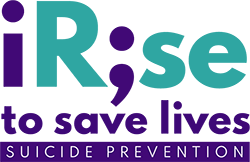I've Lost Someone
Grief is a normal response after losing someone important to us.
When someone dies by suicide, those bereaved often experience a very complicated form of grief caused by a combination of sudden shock, unanswered questions of “Why?”, and feelings of “What could I have done?” They may experience a range of emotions highlighting the dramatic personal effect suicide can have and the important, yet difficult, task of helping someone bereaved by suicide.
For those dealing with the loss of someone they know due to suicide, it’s important they feel comfortable talking about their reactions openly and honestly, find support to make sense of what has happened, deal with their grief in a healthy way, and learn how to move forward with their life after the loss.
How does suicide bereavement affect us? Suicide loss can impact both physical and mental health. It is important people bereaved by suicide are treated with compassion and support.
Those grieving the loss of a loved one to suicide may experience:
- Shock, numbness, denial
- Searching for reasons "Why?"
- Guilt
- Anger/blame
- Despair
- Listlessness
- Stigma and shame
- Loneliness/disconnection
- Depression
- Thoughts of suicide themselves
Help and support after a loss caused by suicide If you are dealing with the loss of a friend or loved one to suicide, it is important to find support to make sense of what has happened, deal with the grief, and learn how to move forward and live with your loss.
The pain of suicide loss can’t be erased quickly. But there are things you can do that will help:
- Take time out — It’s OK to give yourself time away from the pain you are experiencing by doing something you enjoy, even if you don’t feel like doing it at the time.
- Stay connected and accept support — From friends, family, and support networks. This will reduce your sense of isolation and feelings of loneliness associated with grief.
- Honor the deceased person — Talk about them, keep a journal, share memories and photos.
- Stay healthy — Eat well, exercise, try to sleep, and avoid drugs and alcohol.
- Prioritize daily tasks — only do what is essential, avoid making major decisions until you can think more clearly.
- Ask for help if you need it — Talk to a counselor/psychologist, a helpline like Lifeline, or friends and family to find comfort, support, and ways to cope.
- Join a suicide bereavement support group — Sharing your experience with others who have been through similar experiences will help you realize you are not alone and that you can survive. (Provided by Lifeline.org)
Resources:
Grief is a normal response after losing someone important to us. When someone dies by suicide, those bereaved often experience a very complicated form of grief caused by a combination of sudden shock, unanswered questions of “Why?”, and feelings of “What could I have done?” They may experience a range of emotions highlighting the dramatic personal effect suicide can have and the important, yet difficult, task of helping someone bereaved by suicide… READ MORE
If you are feeling suicidal right now, please call 1-800-273-TALK in the U.S. or visit IASP to find a helpline in your country. We also encourage you to talk to someone you trust and let them know about the struggles you are facing…READ MORE
Discovering that someone you care about has tried to end their life can be a devastating experience. You may initially experience emotions such as shock and denial. Sometimes those close to the suicidal person blame themselves for what has happened and may have thoughts similar to, “If only I’d watched them more closely.” It’s important to understand that if someone close to you has attempted suicide, it is not your fault…READ MORE
It can be scary when a friend or loved one is thinking about suicide. Let us help. If someone you know has any warning signs, we encourage you to call 1-800-273-TALK (8255), so that you can find out what resources are available in your area. Your call will be routed to the lifeline center closest to your area code. Your local crisis center may have resources such as counseling or in-patient treatment centers for your friend or family member. Most importantly, please encourage them to call the Lifeline…READ MORE
National Suicide Prevention Lifeline 1-800-273-TALK (8255)
National Hopeline Network
1-800-SUICIDE (1-800-784-2433)
These toll-free crisis hotlines offer 24-hour suicide prevention and support. Your call is free and confidential.
CALL NOW
